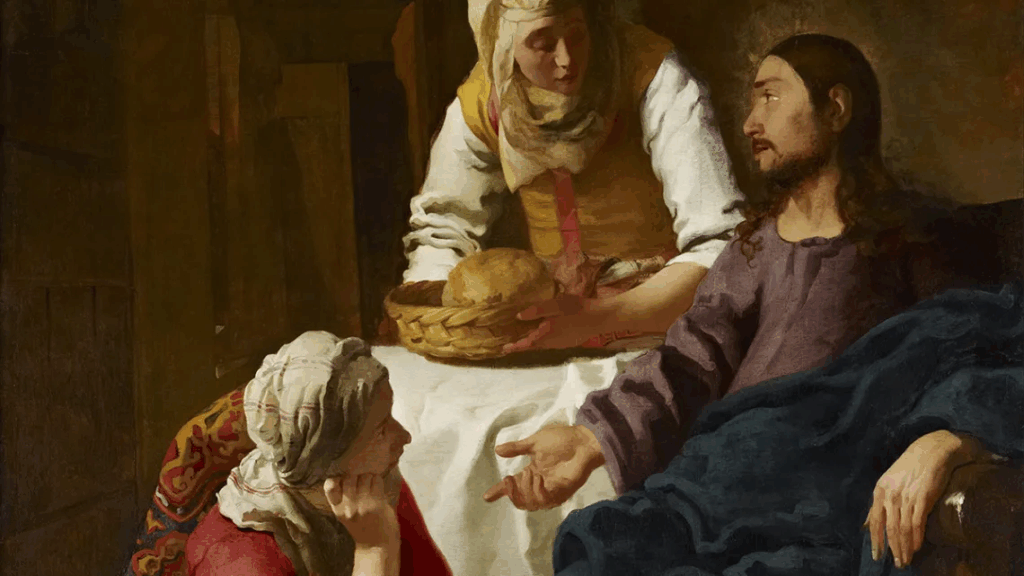When I was in NYC studying for my doctorate, I lived in a Jesuit community famous for the attention they paid to being a community, in particular, to spending quality time with one another both on retreat and in daily life. Each one of them had a kind of charism for asking, with great interest, curiosity, and genuine care, “how are you today?” They were well known for this gift for being present to people, and for offering hospitality, including to houseguests whom they welcomed off the streets.

‘Christ in the House of Martha and Mary’ by Vermeer (1655)
What is especially surprising about the culture of this community is that they were also famous for being activists for a variety of causes, and particularly for standing up against war and for peace. As activists, they had learned that the real deep work of promoting peace and of alleviating the suffering caused by systemic injustices was a long-term labor that would likely never be accomplished in their lifetimes. So while they were each passionate about the causes for which they were dedicating their lives, and sometimes being imprisoned, they also seemed to keep a kind of serene perspective about it all, as if they understood some kind of secret that most of the rest of us have yet to learn.
One night, we were hosting one of their famous gatherings of Catholic social activists and ecumenical partners and friends from all around New York City. There must have been fifty people in that relatively small NY apartment. I had offered to cook a fairly elaborate dinner, and had the general expectation that they would be on hand to clean up at the end of the meal. Maybe you can already intuit where I’m going with this story.
After three hours in the hot kitchen, and several more hours serving and managing special requests, one by one, each of my dear community members seemed to disappear along with the rest of the guests, until only one remained. He was completely focused on the rather hard luck story he was listening to, and even more, the person telling the story. When the guest finally left, I couldn’t restrain myself any more, and was anything but peaceful as I expressed anger and exasperation that my Jesuit brothers seemed so oblivious to my situation, leaving me to cook, serve, and clean up by myself.
Simon nodded his head and smiled, and he said, “David, you did such a generous thing tonight, and truly, none of us could have put on a meal like this, but the truth is, the dishes can wait until tomorrow, and tonight, our guests deserved all our attention. Thank you for making this possible.” Then he walked out and headed to bed. What could I say?
In this familiar passage of Luke, the context is one of Mediterranean hospitality, which is not only characterized by generous and delicious in the providence of diverse dishes of food and treats, but also about making space that is entirely focused on the guests. It requires the host to perform a kind of role, making the hard work of the party appear effortless, and a kind of selflessness that allows the host to make the other person feel like the center of the world. No easy task, and not a task alone. It is a kind of personal disposition that requires inner freedom, focus, and attention.
Jesus finds this inner disposition in Mary. In contrast, he lovingly points out to Martha that she is flustered, anxious, distracted… spread too thin. It is not that he isn’t hungry or hasn’t noticed how beautiful she has made the space where they gather. But he wants her to do what she does, not out of some desire to impress, or out of an anxious perfectionism, but from a peaceful and generous spirit that is able to stay focused on what is more important.
Let’s face it, many of us who are in roles of service and responsibility as leaders are doing what we’re doing because, well, we get things done! And who doesn’t at times feel overwhelmed, distressed, and also frustrated with those who don’t seem to be pulling their weight. But perhaps there are other ways of seeing things.
First, the diversity of our gifts is important for covering all the bases of the work we have to do, and the roles we need to take on. Some of us are better in the kitchen, or better with numbers, or with relationship management. That’s a good thing. So it is helpful to take up the roles and responsibilities for which we have been gifted. And it is good to recognize and affirm the different gifts and contributions of others. This is how teams operate and flourish.
Second, the spirit with which we do things matters. When our attention is scattered, we tend to become more anxious, and in fact, there is a vicious cycle whereby each makes the other more intense. The more anxious we are, the more fragmented, the more fragmented, the less effective. Anxiety can also have another, opposite effect, giving us tunnel vision and hyper focus that blocks out everything and everyone else. In either case, anxiety makes it nearly impossible to be fully present to other people. Whereas a non anxious presence is so valuable and something that requires intention and cultivation. It is not easy to maintain in challenging circumstances, but is especially important for leaders to be able to offer to others.
When Jesus tells Martha that Mary has chosen the better part, he is not judging Martha for being active, but rather, that she is “busy about too many things.” Sometimes, doing one thing well, with attention to depth and quality, is far more fruitful than spreading ourselves too thin about many things. Being truly present to others as a leader is a gift we can give of ourselves, our time and attention.
As we enter into the time that many of us take vacations and make retreat, we take Jesus’ words to heart, and choose the better thing for this moment, to pause, breathe, and become present to God’s renewing, healing, and inspiring presence in our lives. Our team will be on break, escaping the Roman heat, and will look forward to reconnecting in September. Until then, be assured of our prayers and of course, please keep us in yours!
With you on the way,




